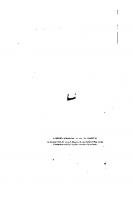Endocytobiology III (Annals of the New York Academy of Sciences, 503) 0897664019
300 31 28MB
English Pages 590 Year 1987
Table of contents :
Endocytobiology III......Page 1
0. Introductory Remarks (pages xi–xii)......Page xi
by M. FERRANDI, S. SALARDI, R. MODICA and G. BIANCHI......Page byline
1. Overview of the Status of Evolutionary Cell Symbiosis Theories (pages 1–16)......Page p1
2. The Origin of Eukaryote and Archaebacterial Cells (pages 17–54)......Page p17
3. Simultaneous Symbiotic Origin of Mitochondria, Chloroplasts, and Microbodies (pages 55–71)......Page p55
4. Evolutionary Significance of the Archaebacteria (pages 72–77)......Page p72
5. Eukaryotic Traits in Archaebacteria : Eukaryotic Cytoplasm from Archaebacterial Origin ? (pages 78–82)......Page p78
6. Are Centrioles Semiautonomous? (pages 83–91)......Page p83
7. Origins of Plant Chloroplasts & Mitochondria, Comparisons of 5S Ribosomal RNAs (pages 92–102)......Page p92
8. Evolution of Organisms & Organelles, Comparative...Analyses of Ribosomal 5S RNA Structure (pages 103–124)......Page p103
9. Structural Diversity of Eukaryotic Small Subunit Ribosomal RNAs : Evolutionary Implications (pages 125–139)......Page p125
1. Paracoccus as a Free-Living Mitochondrion (pages 140–150)......Page p140
2. Cyanelles : From Symbiont to Organelle (pages 151–167)......Page p151
3. Phylogenetic, Phenotypic Relationships between Eukaryotic Nucleocytoplasm & Thermophilic Archaebacteria (pages 168–179)......Page p168
4. Photosomes and Scintillons: Intracellular Localization and Control of Luminescent Emissions (pages 180–186)......Page p180
5. Prokaryotic Origin of Undulipodia: Appl. Panda Principle to the Centriole Enigma (pages 187–197)......Page p187
6. Are Nucleomorphs of Cryptomonads and Chlorarachnion the Vestigial Nuclei of Eukaryotic Endosymbionts? (pages 198–211)......Page p198
7. Viroids : Subcellular Location and Structure of Replicative Intermediates (pages 212–237)......Page p212
1. Predatory Bacteria in Prokaryotic Communities : The Earliest Trophic Relationships (pages 238–250)......Page p238
2. Bacterial Viruses, Prophages, and Plasmids, Reconsidered (pages 251–260)......Page p251
3. Different Endocytobionts Simultaneously Colonizing Ciliate Cells (pages 261–268)......Page p261
4. Initiation and Control of Bioluminescent Symbiosis between Photobacterium leiognathi and Leiognathid Fish (pages 269–283)......Page p269
5. Molecular Interactions in Endosymbiosis between Legume Plants and Nitrogen-Fixing Microbes (pages 284–294)......Page p284
6. Transmission Modes and Evolution of the Parasitism-Mutualism Continuum (pages 295–306)......Page p295
7. Coevolution in Lichens (pages 307–315)......Page p307
8. Natural & Artificial Associations of Ciliates and Algae : ...Steps in Evolution of Stable Endosymbioses (pages 316–329)......Page p316
9. Algal Symbiosis as the Driving Force in the Evolution of Larger Foraminifera (pages 330–347)......Page p330
10. Animals with Photosynthetic Symbionts (pages 348–354)......Page p348
11. Control of Translocation in Some Associations between Invertebrates and Algae (pages 355–358)......Page p355
1. Change of Cellular “Pathogens” into Required Cell Components (pages 359–371)......Page p359
2. Compartmentation of Ca & Energy Metabolic Pathways : Eukaryote Evolution & Cell Proliferation Control (pages 372–379)......Page p372
3. Eubacterial, Eukaryotic, and Unique Features in the Mitochondrial Genome of Oenothera (pages 380–390)......Page p380
4. Gene Transfer : Mitochondria to Nucleus (pages 391–401)......Page p391
5. Nuclear Transfer from Parasite to Host : A New Regulatory Mechanism of Parasitism (pages 402–423)......Page p402
6. Evolution of Eukaryotic Cells via Bridge Algae : The Cyanidia Connection (pages 424–437)......Page p424
7. Transition Stages in the Evolution of the Glucosyltransferase Isozymes (pages 438–448)......Page p438
1. Bacterial and Algal Effects on Metamorphosis in Life Cycle of Cassiopea andromeda (pages 449–458)......Page p449
2. Cell Division Cycles, Circadian Clocks : Metabolic Oscillator in Algal Flagellate Euglena (pages 459–475)......Page p459
3. Endocytobiotic Coordination, Intracellular Calcium Signaling, and the Origin of Endogenous Rhythms (pages 476–495)......Page p476
4. Endocytobionts and Mitochondria as Determinants of Leafhopper Egg Cell Polarity (pages 496–514)......Page p496
5. Tubulinlike Protein from Spirochaeta bajacaliforniensis (pages 515–527)......Page p515
1. Catalyst (pages 528–529)......Page p528
1. Evolutionary Differentiation in Gymnodinioid Zooxanthellae (pages 530–533)......Page p530
2. Cell Culture Models to Study Symbiosis (pages 534–537)......Page p534
3. Distribution & Transmission of Cytoplasmic DNA during Multiplication in Netrium digitus (Chlorophyceae) (pages 538–540)......Page p538
4. An Aphid Endosymbiont Has a Large Genome Rich in Adenine and Thymine (pages 541–543)......Page p541
5. Dynamics and Host Influence of Methane Production by Microbial Symbionts in a Lower Termite (pages 544–545)......Page p544
6. Origins of Eukaryote Sensory Transduction (pages 546–547)......Page p546
7. Vesicle in Bacteroid-Containing Cells of Root Nodules, a Kind of Organelle : ...Interrelation between Rhizobium & Legume Plants (pages 548–549)......Page p548
8. The Cyanelle Genome of Cyanophora paradoxa : Chloroplast and Cyanobacterial Features (pages 550–552)......Page p550
9. Role of Light in the Symbiosis between Algae and Hydra (pages 553–554)......Page p553
10. Major Acyl Lipids of Cyanelles from Glaucocystis nostochinearum (pages 555–558)......Page p555
11. Nucleotide Sequence of Cyanophora paradoxa Cellular and Cyanelle-Associated 5S Ribosomal RNAs (pages 559–561)......Page p559
12. Chloroplast Retention by Marine Planktonic Ciliates (pages 562–565)......Page p562
13. Plant & Bacterial Cell Wall Deformations in Functional Part of Bacterial Leaf Nodule of Spearflower [Ardisia crispa, Myrsinaceae] (pages 566–569)......Page p566
14. Condensation of Nucleoid Material in Leafhopper Endocytobionts (pages 570–574)......Page p570
15. Cytochemical Determination of DNA Content in Nucleus & Nucleoids of Cyanidium and Some Microbial Cells (pages 575–577)......Page p575
16. Structural Homologies in the D-Loop-Containing Region of Vertebrate Mitochondrial DNA (pages 578–579)......Page p578
17. Killer Particles in the Macronucleus of Paramecium caudatum (pages 580–583)......Page p580
18. Antigenic Properties of Erythrocyte Membrane from a Hypertensive Strain of Rats (pages 584–587)......Page p584
Endocytobiology III......Page 1
0. Introductory Remarks (pages xi–xii)......Page xi
by M. FERRANDI, S. SALARDI, R. MODICA and G. BIANCHI......Page byline
1. Overview of the Status of Evolutionary Cell Symbiosis Theories (pages 1–16)......Page p1
2. The Origin of Eukaryote and Archaebacterial Cells (pages 17–54)......Page p17
3. Simultaneous Symbiotic Origin of Mitochondria, Chloroplasts, and Microbodies (pages 55–71)......Page p55
4. Evolutionary Significance of the Archaebacteria (pages 72–77)......Page p72
5. Eukaryotic Traits in Archaebacteria : Eukaryotic Cytoplasm from Archaebacterial Origin ? (pages 78–82)......Page p78
6. Are Centrioles Semiautonomous? (pages 83–91)......Page p83
7. Origins of Plant Chloroplasts & Mitochondria, Comparisons of 5S Ribosomal RNAs (pages 92–102)......Page p92
8. Evolution of Organisms & Organelles, Comparative...Analyses of Ribosomal 5S RNA Structure (pages 103–124)......Page p103
9. Structural Diversity of Eukaryotic Small Subunit Ribosomal RNAs : Evolutionary Implications (pages 125–139)......Page p125
1. Paracoccus as a Free-Living Mitochondrion (pages 140–150)......Page p140
2. Cyanelles : From Symbiont to Organelle (pages 151–167)......Page p151
3. Phylogenetic, Phenotypic Relationships between Eukaryotic Nucleocytoplasm & Thermophilic Archaebacteria (pages 168–179)......Page p168
4. Photosomes and Scintillons: Intracellular Localization and Control of Luminescent Emissions (pages 180–186)......Page p180
5. Prokaryotic Origin of Undulipodia: Appl. Panda Principle to the Centriole Enigma (pages 187–197)......Page p187
6. Are Nucleomorphs of Cryptomonads and Chlorarachnion the Vestigial Nuclei of Eukaryotic Endosymbionts? (pages 198–211)......Page p198
7. Viroids : Subcellular Location and Structure of Replicative Intermediates (pages 212–237)......Page p212
1. Predatory Bacteria in Prokaryotic Communities : The Earliest Trophic Relationships (pages 238–250)......Page p238
2. Bacterial Viruses, Prophages, and Plasmids, Reconsidered (pages 251–260)......Page p251
3. Different Endocytobionts Simultaneously Colonizing Ciliate Cells (pages 261–268)......Page p261
4. Initiation and Control of Bioluminescent Symbiosis between Photobacterium leiognathi and Leiognathid Fish (pages 269–283)......Page p269
5. Molecular Interactions in Endosymbiosis between Legume Plants and Nitrogen-Fixing Microbes (pages 284–294)......Page p284
6. Transmission Modes and Evolution of the Parasitism-Mutualism Continuum (pages 295–306)......Page p295
7. Coevolution in Lichens (pages 307–315)......Page p307
8. Natural & Artificial Associations of Ciliates and Algae : ...Steps in Evolution of Stable Endosymbioses (pages 316–329)......Page p316
9. Algal Symbiosis as the Driving Force in the Evolution of Larger Foraminifera (pages 330–347)......Page p330
10. Animals with Photosynthetic Symbionts (pages 348–354)......Page p348
11. Control of Translocation in Some Associations between Invertebrates and Algae (pages 355–358)......Page p355
1. Change of Cellular “Pathogens” into Required Cell Components (pages 359–371)......Page p359
2. Compartmentation of Ca & Energy Metabolic Pathways : Eukaryote Evolution & Cell Proliferation Control (pages 372–379)......Page p372
3. Eubacterial, Eukaryotic, and Unique Features in the Mitochondrial Genome of Oenothera (pages 380–390)......Page p380
4. Gene Transfer : Mitochondria to Nucleus (pages 391–401)......Page p391
5. Nuclear Transfer from Parasite to Host : A New Regulatory Mechanism of Parasitism (pages 402–423)......Page p402
6. Evolution of Eukaryotic Cells via Bridge Algae : The Cyanidia Connection (pages 424–437)......Page p424
7. Transition Stages in the Evolution of the Glucosyltransferase Isozymes (pages 438–448)......Page p438
1. Bacterial and Algal Effects on Metamorphosis in Life Cycle of Cassiopea andromeda (pages 449–458)......Page p449
2. Cell Division Cycles, Circadian Clocks : Metabolic Oscillator in Algal Flagellate Euglena (pages 459–475)......Page p459
3. Endocytobiotic Coordination, Intracellular Calcium Signaling, and the Origin of Endogenous Rhythms (pages 476–495)......Page p476
4. Endocytobionts and Mitochondria as Determinants of Leafhopper Egg Cell Polarity (pages 496–514)......Page p496
5. Tubulinlike Protein from Spirochaeta bajacaliforniensis (pages 515–527)......Page p515
1. Catalyst (pages 528–529)......Page p528
1. Evolutionary Differentiation in Gymnodinioid Zooxanthellae (pages 530–533)......Page p530
2. Cell Culture Models to Study Symbiosis (pages 534–537)......Page p534
3. Distribution & Transmission of Cytoplasmic DNA during Multiplication in Netrium digitus (Chlorophyceae) (pages 538–540)......Page p538
4. An Aphid Endosymbiont Has a Large Genome Rich in Adenine and Thymine (pages 541–543)......Page p541
5. Dynamics and Host Influence of Methane Production by Microbial Symbionts in a Lower Termite (pages 544–545)......Page p544
6. Origins of Eukaryote Sensory Transduction (pages 546–547)......Page p546
7. Vesicle in Bacteroid-Containing Cells of Root Nodules, a Kind of Organelle : ...Interrelation between Rhizobium & Legume Plants (pages 548–549)......Page p548
8. The Cyanelle Genome of Cyanophora paradoxa : Chloroplast and Cyanobacterial Features (pages 550–552)......Page p550
9. Role of Light in the Symbiosis between Algae and Hydra (pages 553–554)......Page p553
10. Major Acyl Lipids of Cyanelles from Glaucocystis nostochinearum (pages 555–558)......Page p555
11. Nucleotide Sequence of Cyanophora paradoxa Cellular and Cyanelle-Associated 5S Ribosomal RNAs (pages 559–561)......Page p559
12. Chloroplast Retention by Marine Planktonic Ciliates (pages 562–565)......Page p562
13. Plant & Bacterial Cell Wall Deformations in Functional Part of Bacterial Leaf Nodule of Spearflower [Ardisia crispa, Myrsinaceae] (pages 566–569)......Page p566
14. Condensation of Nucleoid Material in Leafhopper Endocytobionts (pages 570–574)......Page p570
15. Cytochemical Determination of DNA Content in Nucleus & Nucleoids of Cyanidium and Some Microbial Cells (pages 575–577)......Page p575
16. Structural Homologies in the D-Loop-Containing Region of Vertebrate Mitochondrial DNA (pages 578–579)......Page p578
17. Killer Particles in the Macronucleus of Paramecium caudatum (pages 580–583)......Page p580
18. Antigenic Properties of Erythrocyte Membrane from a Hypertensive Strain of Rats (pages 584–587)......Page p584

![Third Conference on Vitamin C (Annals of the New York Academy of Sciences) [illustrated]
0897663918, 9780897663915](https://ebin.pub/img/200x200/third-conference-on-vitamin-c-annals-of-the-new-york-academy-of-sciences-illustrated-0897663918-9780897663915.jpg)

![Second Conference on Vitamin C: [papers] (Annals of the New York Academy of Sciences ; v. 258)
0890720118, 9780890720110](https://ebin.pub/img/200x200/second-conference-on-vitamin-c-papers-annals-of-the-new-york-academy-of-sciences-v-258-0890720118-9780890720110.jpg)
![New Techniques and Ideas in Quantum Measurement Theory (Annals of the New York Academy of Sciences) [1 ed.]
0897663551, 9780897663557](https://ebin.pub/img/200x200/new-techniques-and-ideas-in-quantum-measurement-theory-annals-of-the-new-york-academy-of-sciences-1nbsped-0897663551-9780897663557.jpg)





